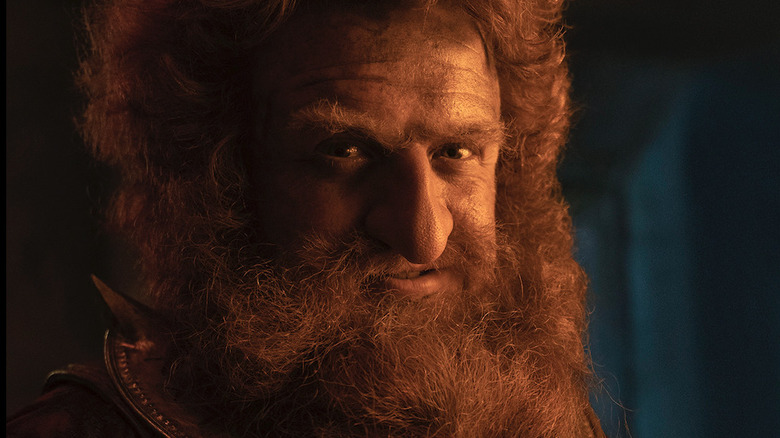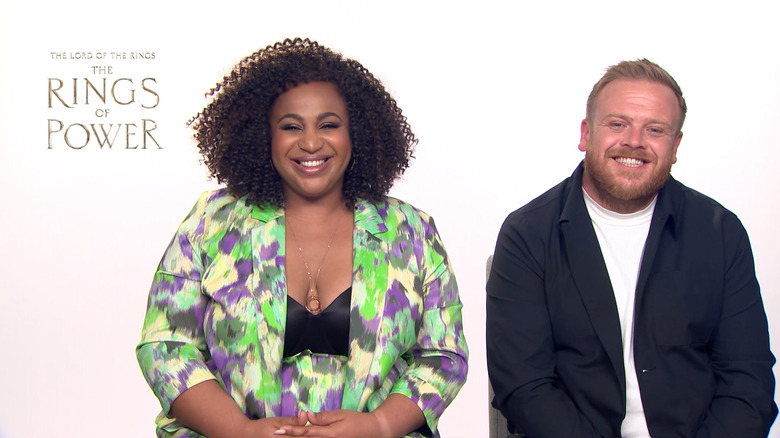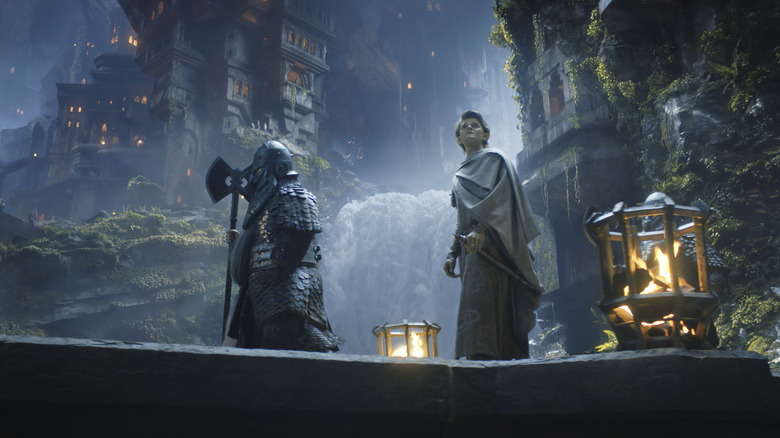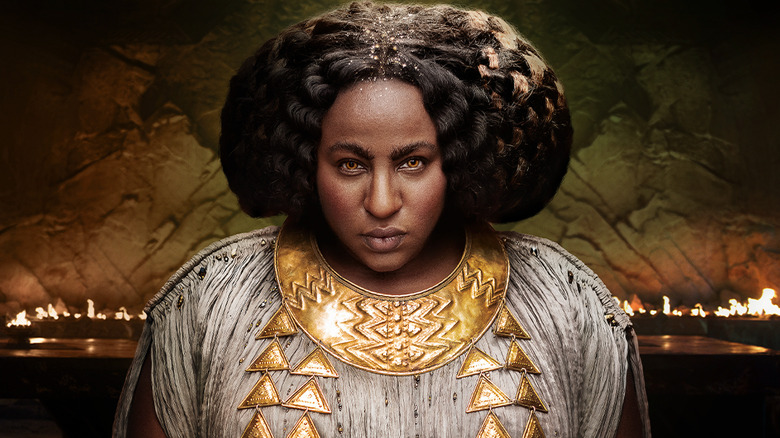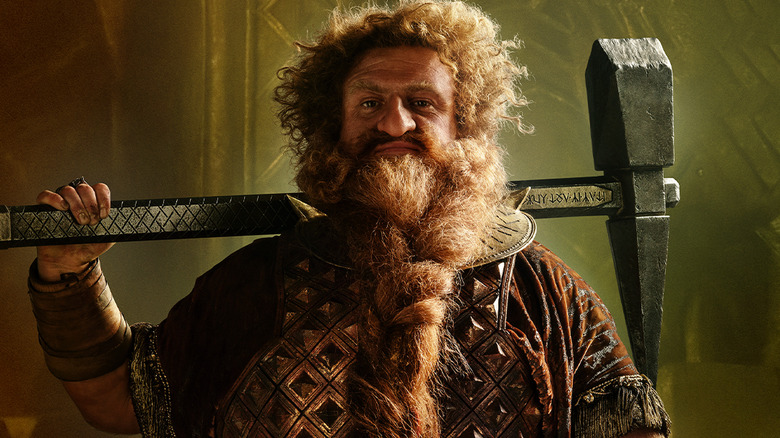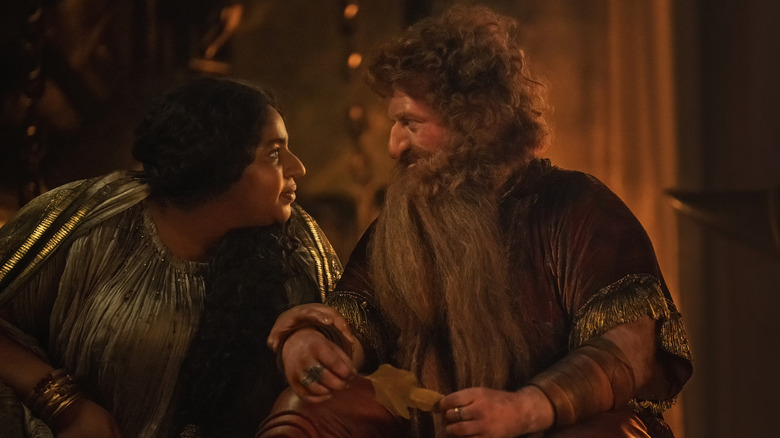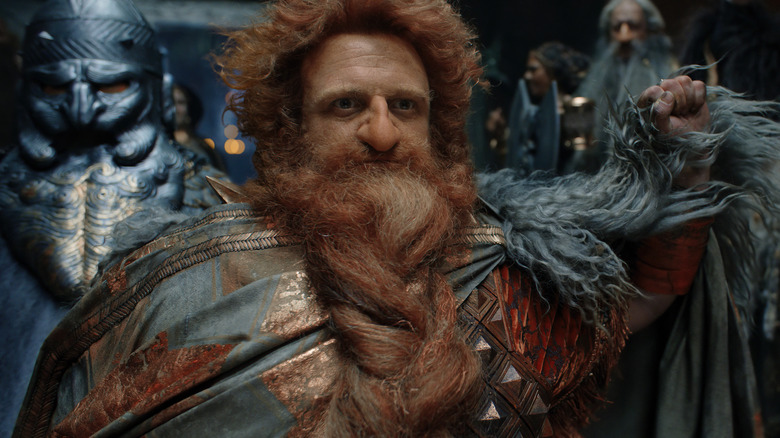Owain Arthur And Sophia Nomvete Talk Dwarven Marriage, Strong Women, And Source Material - Exclusive Interview
Sophia Nomvete and Owain Arthur portray the characters of Princess Disa and Prince Durin IV in Prime Video's massive "The Lord of the Rings: The Rings of Power" streaming series. The show will explore the vast underground kingdom of Moria as part of the story. While fans of "The Lord of the Rings" may associate the subterranean wasteland with Balrogs, Orcs, and a general inky blackness, during "Rings of Power," the area is still a thriving kingdom bustling with busy Dwarves.
At this earlier point in Middle-earth history, Moria is called Khazad-dûm, and it's a wonder to behold. The kerfuffle with the Balrog (which will eventually drive the Dwarves out of their beloved home in a hurry) is still thousands of years in the future. In fact, when the show starts, Khazad-dûm is in its heyday, and it's ruled by Durin III, the third Dwarven king in a row to hold the same name (and likeness) as the oldest and greatest Dwarven king, Durin I. While Durin III is in charge, the aged king is supported by his son, Durin IV (Owain Arthur), and his wife, Disa (Sophia Nomvete).
Back in June, we had a chance to sit down with Arthur and Nomvete and ask them a few questions. The sprawling conversation covered Dwarven marriage, the indomitable traits of Dwarven women, Durin and Disa's personal relationship with one another, and what it was like to create Khazad-dûm when there's so little source material to work from. But we started with an essential question: Who are the actors' favorite Tolkien characters?
They picked a classic favorite character
What is each of your favorite Tolkien characters from the original source material? Nothing from an adaptation.
Owain Arthur: Have you got one? I've not really thought about this, to be perfectly honest with you. There are so many options.
Sophia Nomvete: This might be an obvious and a cliché, but I'm going to go with Bilbo.
That's a great one, though.
Nomvete: It's Bilbo. He possesses so much heart ... He's driven by so many forces and feelings and his mind is so busy, and I want to follow him wherever he goes. He's got to be my favorite if I had to pick.
Arthur: Do you know what? I'm going to agree with you. You sold it to me.
Nomvete: Oh, did I?
Arthur: Yeah.
He's the first one we all meet.
Arthur: You're a savage if you don't like Bilbo.
What do happy Dwarves in a thriving kingdom look like?
To focus a little more on your characters ... We are not used to seeing happy Dwarves in Middle-earth living thriving, fulfilling lives. By the Third Age, they're all kind of broken stories; they're living in exile. What has it been like? Can you give a little background on bringing a sense of life to Second Age Dwarves, specifically in Khazad-dûm itself, which we're used to as Moria?
Nomvete: It's been incredibly exciting, because we are, as you say, creating a world that is very much alive. They are thriving. They are in power. We have had time and space to discover all of the dimensions of a Dwarf, how they interact, how they function within Khazad-dûm, Moria. How does it all work? What do they see? What do they strive for? What are the secrets that they're holding?
These are all questions that we've asked each other and that we've been able to discuss and delve into. We've left nothing unturned, and we've been able to really put the meat on the bones of anything that we've seen before for the Dwarven race.
Arthur: There's so much to explore there and the secrecy of Khazad-dûm and the talks around it, and I'm like, "I wonder what it was like, what's it going to be like?" It's like we're peeling back the curtain. You going to go [there], hopefully.
Nomvete explains the strengths and necessities of the female Dwarves
Sophia, you play Disa, and she is made up for the show — but you have to, because there's only one Dwarven woman mentioned in all of the text, Dís, which is very close. Coming up with a Dwarven character, it does say in the text that Dwarven women are strong-willed and independent, but they're not seen very often. Taking those little pieces, what has it been like cobbling together not just your character, but also representation of Dwarven women in the first place on screen?
Nomvete: It's been absolutely incredible. It's been a complete joy because we have those small little trinkets and pieces of information, but it also means that we've been able to work from the ground up and to be able to shine a light on all the strengths and necessities of the female Dwarves within the world of Tolkien. We have drawn on everything that we know about strong, empowered women, and we have been able to draw on everything we know about Middle-earth, Dwarves, and Khazad-dûm and create an explosion that is Princess Disa.
Arthur dishes on Dwarven rings and wives
Owain, you're Durin IV. Dwarven rings are different from the other rings. They're all different in their own way, but [Dwarven rings] are pretty unique in the sense that they're associated with power, but also obsession, wealth, and madness. You're dealing with a father who has a ring, and then in the text, your character gets the ring eventually. How has that knowledge of that potential impacted how you and influenced how you've created the character in Season 1?
Arthur: As a core, starting from the beginning, it can't really affect on anything because you know the ring has to come into play. I'm certainly looking forward to the prospect of that happening.
What kind of character have you created to then receive a ring like that?
Arthur: Well, being the line of Durin is quite a responsibility, I suppose, but also going on the subject of Dwarven women, we know that Dwarves aren't particularly interested in women — it's all about working hard in the mines and creating their craft. The fact that Durin has a wife and is very much interested and giving a lot of his time and effort and heart to his wife says a lot about him.
Dwarven marriage, stubbornness, unconditional love, and marital equality
Tolkien does address Dwarven marriage and he does mention that it's rare — often both women and men are separate, and they're interested in different things. When it happens, though, the actual quote I pulled was "Dwarves takes only one wife or husband in each of their lives." He adds that they're jealous of each other. There's an intensity there when it happens. Have you let that influence how you've built your characters' relationship?
Nomvete: There is definitely a huge amount of passion between us and in the best possible way. Sometimes, if there's moments where we are trying to convince one another of something, that can get really heated as well. There is this gorgeous dynamic and chemistry where we are pushed and pulled and thrown into all different situations. But at the core of Disa and Durin is love — genuine, unconditional love. We will always come back to that, but you will certainly enjoy the directions in which they're stretched, and seeing the height of those emotions, [where] you'll see some definite fire.
Arthur: The qualities of the Dwarves are there, with each other and amongst ourselves as well. You'll definitely see a stubborn Durin.
Nomvete: But you will also see the equality of male and female Dwarves, which is desperately important.
The task of filling in the gaps with sparse Second Age Dwarvish information
The source material in general for the Second Age is very thin. Definitely with the Dwarves, there's not a lot there, so you had to fill in and lead up to certain events where we are aware of how things end at certain points. I know you weren't writing the scripts, but how challenging has it been to come up with that and fill in those gaps?
Arthur: Well, you can draw on the other books and use that to feed and support some decisions. What that does mean is that it gave us free rein, basically, and a place to explore and collaborate with each other, which is really exciting. As the seasons go by, as the episodes go by, [with] that exploration, you find out different things about Dwarven life and culture.
"The Lord of the Rings: The Rings of Power" premiers on September 2 and will be available on Prime Video. The story will trace several of the most important events of the Second Age as it follows its massive cast from one end of Middle-earth to the other.
This interview was edited for clarity.
